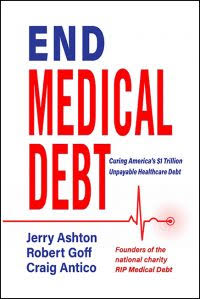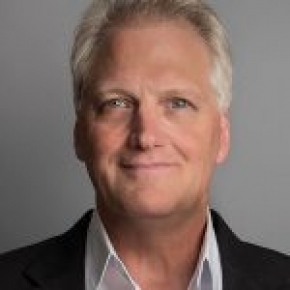
End Medical Debt: Curing America’s $1 Trillion Unpayable Healthcare Debt, by Jerry Ashton, Robert Goff, Craig Antico (Hoku House, Kauai, Hawaii, 2018, 181 pages).
Book Review by Dennis Moore
Of all the forms of equality,
Injustice in health is the most
shocking and inhumane.
- Martin Luther King, Jr.
April 6, 2019 (San Diego) - The authors have written a timely and thought-provoking book about healthcare and debt, coming at a time when the Trump Administration is proposing doing away with the Affordable Care Act (ACA), or better known as Obamacare.
Jerry Ashton, Robert Goff and Craig Antico, founders of the national charity RIP Medical Debt, a 501 (c)(3) not-for-profit company based in New York, incorporated in 2014, locates, buys and forgives unpayable medical debt for those burdened by financial hardship. In a phone interview with one of the authors, Craig Antico, he stated to me: “People don’t realize the hardships that medical debt brings.”
 RIP to date has abolished $500 million in medical debt for about 250,000 Americans. They support communities across the country in conducting local medical debt forgiveness campaigns. They have a special interest in forgiving the medical debts of veterans.
RIP to date has abolished $500 million in medical debt for about 250,000 Americans. They support communities across the country in conducting local medical debt forgiveness campaigns. They have a special interest in forgiving the medical debts of veterans.
RIP buys large batches of medical billing accounts in “portfolios” for about a penny on the dollar, so donations to RIP deliver “a lot of bang for the buck.” A $100 donation can forgive $10,000 in debt.
The authors, with the assistance of editor Judah Freed, points out in End Medical Debt that in our urgent debates over U.S. healthcare costs and coverage, we have overlooked America’s devastating medical debt crisis. Medical debt continues to be one of the leading causes of bankruptcy in the United States.
They further point out that everyone knows someone who struggles to pay their medical bills. Millions of Americans confront $1 trillion in medical debt that produces hardships for individuals, families, communities, and our nation as a whole. I am sure that readers of this book can relate to this. As a matter of fact, the authors are donating all book royalties to forgiving medical debt.
In a novel approach by the authors of helping to address ending medical debt, the book features tips for your personal medical debt.
This triumvirate of experts, considering their business and healthcare background and experience, makes them eminently qualified to write this groundbreaking and informative book.
 Jerry Ashton has 40 years of experience in the credit and collections industry. In 1995, to uplift how debtors are treated, he founded CFO Advisors, servicing a half billion in receivables for Fortune 500 companies. The Occupy Wall Street “Rolling Jubilee” inspired him and CFO partner Craig Antico to found RIP Medical Debt. Jerry serves as the Education and Outreach Director.
Jerry Ashton has 40 years of experience in the credit and collections industry. In 1995, to uplift how debtors are treated, he founded CFO Advisors, servicing a half billion in receivables for Fortune 500 companies. The Occupy Wall Street “Rolling Jubilee” inspired him and CFO partner Craig Antico to found RIP Medical Debt. Jerry serves as the Education and Outreach Director.
 Robert Goff retired from 40 years in the healthcare industry to consult in care delivery, organization and financing. His past roles include hospital administration, regulator, managed care executive, and association executive. He developed one of New York state’s first HMOs. He later served as head of the University Physicians Network. Robert is RIP’s founding board member.
Robert Goff retired from 40 years in the healthcare industry to consult in care delivery, organization and financing. His past roles include hospital administration, regulator, managed care executive, and association executive. He developed one of New York state’s first HMOs. He later served as head of the University Physicians Network. Robert is RIP’s founding board member.
Craig Antico is a 30-year leader in credit, collections, debt buying, outsourcing, and data analytics. He has worked with IBM, Johnson & Johnson, collection agencies, medical distributors. He early joined eDebt, the exchange for distressed debt. He joined Jerry at CFO and as the founder of RIP Medical Debt. Craig serves as the Operations Director.
An example of what this book, End Medical Debt, is all about is described in an initiative by “Revolution Annapolis”, a church in Annapolis, Maryland. Revolution Annapolis partnered with the non-profit organization RIP Medical Debt to purchase and forgive $1,893,288.73 of medical debt from 14 counties in central and eastern Maryland. More than 900 families have been impacted by this act of no-strings-attached generosity, according to a news release from the church.
The money for the debt relief effort – an amount of more than $15,000 – was raised by Revolution Annapolis during the Christmas season last year and included donations from individuals throughout the United States. It was then donated to RIP Medical Debt, a non-profit organization that purchases medical debt from collections at a discounted price. By coordinating beforehand, Revolution Annapolis was able to focus their debt relief on their local community first, beginning by purchasing all of the available debt in Anne Arundel County. Then, as their fundraising efforts grew, they were able to increase the radius and impact of their project to a reach and scale they never anticipated.
Terms such as “Medicare for All” and the “Affordable Care Act (ACA)” are weighed and analyzed in this insightful book. The authors indicate that under “HR 676”, healthcare would be publicly financed, but privately operated, same as Medicare.
In further regard to the “Affordable Care Act (ACA)”, or “Obamacare”, the authors of End Medical Debt, makes a profound statement. I am not sure if it is to buttress their claims or add fuel to the debate about doing away with Obamacare. They state: “The ACA’s promises were more political than practical.”
They compare and analyze various healthcare providers throughout the country, such as Empire BlueCross BlueShield, UnitedHealthcare and Anthem (BlueCross BlueShield) as it relates to medical debt. They indicate that the products offered through a Health Insurance Exchange do not cover out-of-network care except in an emergency, which often means no coverage. The authors further indicate in their book that these “narrow” networks are claustrophobic.
The authors indicates that each insurance carrier uses proprietary data, proprietary algorithms, to decide which providers can be in its narrow network. This lacks transparency and disregards existing patient-physician relationships, and asks the question; is cost the only criteria – what about quality or efficiency? This makes me want to look at and closely consider my own healthcare provider; L.A. Care.
Further stated in their book; “The only insurer offering products on New Hampshire’s exchange, Anthem (BlueCross BlueShield) excluded ten of the state’s 26 hospitals. Hospitals are included or excluded based on unit price.”
A noteworthy and classic example of insurance coverage, or lack thereof, which can contribute to medical debt is pointed out in End Medical Debt.The authors state: “We seldom invest time to understand the limitations of our insurance coverage.”
For the purposes of this argument or case study, they state: “Aetna, the health insurance company, has taken an aggressive stance against enticing patients into financial traps. In New York, they filed a lawsuit against two doctors, in-network Dr. Ramin Rak and out-of-network Dr. Shuriz Hishmeh. Dr. Rak used Dr. Hishmeh as his co-surgeon on procedures. Dr. Rak got $183,294 in-network. Dr. Hishmeh got more than $1.1 million out-of-network. Crain’s New York Business reported the patient was liable for all costs for out-of-network surgery above Aetna’s allowable rates.” Is it any wonder that America has a $1 trillion unpayable healthcare debt with these types of shenanigans!!
The authors indicates in End Medical Debt that both of the proposed Medicare for All laws, one sponsored by Rep. Keith Ellison (D-MN), the other by Sen. Bernie Sanders (D-VT), would cut the current 12 percent rate of uninsured people to zero. Everyone would be enrolled into one plan without any deductibles or co-payments. No one could opt out.
Through random acts of charity, this book demonstrates what was always the solution to ending medical debt; “People helping people, voluntarily and without coercion.” Two New Yorkers erased $1.5 million in medical debt for hundreds of strangers. Over the summer months, the women raised $12,500 and sent it to the debt-forgiveness charity (RIP), which then purchased a portfolio of $1.5 million of medical debts on their behalf, for about half a penny on the dollar.
In my phone interview with Craig Antico, he indicates that there are 3 criteria under which they (RIP) selects someone for medical debt relief, one of which is that the candidate should be making less than 2 times the national poverty level.
Mike Williams, a Bosnia military veteran wrote this beautiful song to identify how the healthcare system is impacting other veterans; "The Price We Paid!" listen here.
The authors gives us an education on how we as a society got into this seemingly unpayable and un-curable medical debt, but fortunately in this book, they offer solutions and relief from it. This is an invaluable book that everyone should read.
 Dennis Moore has been the Associate Editor of the East County Magazine in San Diego and he is the book review editor for SDWriteway, an online newsletter for writers in San Diego that has partnered with the East County Magazine. He is also an author of a book about Chicago politics. Mr. Moore can be contacted at contractsagency@gmail.com or you can follow him on Twitter at: @DennisMoore8.
Dennis Moore has been the Associate Editor of the East County Magazine in San Diego and he is the book review editor for SDWriteway, an online newsletter for writers in San Diego that has partnered with the East County Magazine. He is also an author of a book about Chicago politics. Mr. Moore can be contacted at contractsagency@gmail.com or you can follow him on Twitter at: @DennisMoore8.







Comments
Luigi Mangione murder of UnitedHealthCare CEO Thompson!
With all the news about healthcare providers shortchanging consumers, I guess we should have saw this coming, the recent and unfortunate shooting of UnitedHealthCare CEO Brian Thompson by Luigi Mangione. It saddens me that this is what it comes to in this country, murder justifying the ills of our society. Mr. Thompson deserved a lot better, and it has me comparing and thinking of my own health care provider, L.A. Care. We have to find better ways of resolving our issues, than at the end of a gun barrel. Heartfelt Condolences to the family of Brian Thompson.
Luigi Mangione murder of UnitedHealthCare CEO Thompson!
With all the news about healthcare providers shortchanging consumers, I guess we should have saw this coming, the recent and unfortunate shooting of UnitedHealthCare CEO Brian Thompson by Luigi Mangione. It saddens me that this is what it comes to in this country, murder justifying the ills of our society. Mr. Thompson deserved a lot better, and it has me comparing and thinking of my own health care provider, L.A. Care. We have to find better ways of resolving our issues, than at the end of a gun barrel. Heartfelt Condolences to the family of Brian Thompson.
Many in Miami-Dade find their medical debts paid off!
Through RIP Medical Debt many in Miami-Dade have had their medical debts paid off.
Twiggy continues with empty soundbites
Twiggy is absolutely right, our health insurance isn’t paid for by our taxes; but our health care is. Through sales taxes, excise taxes, income taxes, property taxes, and Medicare tax, the Federal government, State, County, and Municipal governments pay for public employees heath care and the health care of workers working for companies contracted by governments to do various projects. Through taxes we pay for military health care, Tricare (health insurance for families of military personnel), Veterans Administration (note that VA scandal involved those waiting to get into VA system, research has found that once in VA their level of care excellent), etc. In addition, tax deductions for health insurance is also us paying for health care. If one gets a tax deduction, then someone else not getting it is contributing a larger share of their income to taxes. There is no real difference between giving a tax deduction or just paying with a voucher. The sum total of our taxes going to health care is approximately 65% of total health care costs in the U.S. As both a total amount and percentage of GDP this is a much as the highest other nation covering ALL their people at equally high level of care. Approximately 30% of our total health care costs do NOT go to health care; but to the excess administration, advertisements, obscene incomes of the CEOs and other higher ups in for-profit insurance companies, and shareholders. As a result we have a high number of uninsured, underinsured, and rank poor internationally on outcome measures such as life-expectancy, infant mortality, and quality of life for chronic diseases. There is absolutely NO way one can claim that the 30 cents on the dollar going to the for-profit sector improves our health care. On the contrary, the denials, delays, limited networks, etc. actually have a detrimental effect.
Obama Care is NOT a good system. While it did increase the number of insured people, it increased, through tax deductions and vouchers, the total amount of tax dollars going to our health care from 60% to 65%. Obama wanted signature legislation his first year, so he created a system that would increase the profits of the already highly profitable for-profit companies to get their support and they immediately began gaming the system, limiting networks, etc. A single-payer system, such as Medicare, which is a highly popular government program, has administrative costs less than 3%.
Health care doesn’t fit into a market model. One simple exaggerated example. Imagine you are in a car accident, an ambulance picks you up, starts to take you to the nearest emergency room. Do you get on a cell phone and phone all the emergency rooms to get their prices? And how can you know in advance what care you will need? And what if you are in so much pain or unconscious. One of the basic assumptions of a free market is that the consumer can take time to check out the quality and pricing of various products and decide. Google university is not for most people without the basic understanding of medicine a good choice.
As for the Democrats owning slaves, not quite. Prior to the Civil War the Democratic party was the largest political party in the United States, including voters from both the North and the South. The Republican Party started in 1856. Following the end of the Civil War, the South went with the Democratic Party; but when the Democratic Party began supporting Civil Rights, Southerners left for the Republican Party. What Twiggy fails to understand is that party names may remain; but political positions can change drastically.
As for giving away our tax monies, both parties do this; but the Republicans, at least in the past 30 years or so, have taken the lead. It was the Republican Party, with George Bush as President and Henry Paulson as Secretary of the Treasury, a long-time Wall Streeter, who engineered the bailout after the 2008 crash. Bankers created fake mortgages, NINJAS (no income, no job, no assets), collected their commissions, then packaged and sold to stock market, collecting additional commissions. Did any of them go to jail? Did any lose their jobs? Instead we, the taxpayer, bailed them out and they even collected bonuses. Could things have been done differently? Yep. In the 1990s two of Sweden’s largest banks were facing bankruptcy. The Swedish government took them over, firing the higher ups, the investors losing their money (as is expected in a market competitive system when a company goes bankrupt), kept middle management, tellers, etc in place, stabilized the banks, then sold them back to private investors a couple of years later. Costing the Swedish taxpayer almost nothing. We did this with Fanny Mae; but Paulson wanted to save his cronies. Despite all his faults, Obama did create the Consumer Finance Protection Agency. If you recall, Wells Fargo Bank employees opened and closed fake accounts, collecting commissions. Prior to CFPA, each individual account holder would have under mandatory arbitration had to sue for the probably less than $100, that is, if they even were aware of it. Well, now under Trump, the CFPA would no longer be able to hold Wells Fargo to account. Just as with a sports event needing an unbiased referree/umpire, a market system needs one as well; but the Republicans have now removed that referee. It is the Republican party who nowadays uses our tax dollars to subsidize corporations and the wealthy. Though some Democrats also beholden to Wall Street, more than the Republicans they try to at least use some of our tax monies to benefit us.
Twiggy just shows her gross ignorance when she keeps throwing out the word “Socialist”. Socialism would be the government running our farms, car factories, steel plants, etc. All nations, from the far right to the far left have some taxed based, community funded entities, e.g. police, fire departments, water works, Coast Guard, public schools, roads, bridges, dams, etc.
When I lived in Sweden, a so-called socialist nation, on a per capita basis there were more small privately owned businesses than in the United States and on a per capita basis, more medical research and publications in peer-reviewed journals.
Though the latest edition costs over $100, the 4th Edition, I would strongly urge Twiggy and others to read Thomas Rice “The Economics of Health Reconsidered (3rd ed)”. He explains in detail the basic principals of market economics and how health care doesn’t fit. You might learn something; but I doubt it. The 3rd edition is available on Amazon, inexpensive copies.
Actually, I do know the difference between a Republic and a Democracy. My BA from over a half century ago was a duel major, Political Science and Social Psychology. I had two semesters of American Government, a semester of Political Theory, three semesters of Constitutional Law, etc. I had considered going to law school; but changed my mind. And, though my main focus is health care, living alone with a dog, I continue to read books on history, economics, politics, etc.
Twiggy just continues with empty soundbites.
RIP Medical Debt featured among game-changers insideARM
RIP Medical Debt has garnered the attention of insideARM in a recent article.
Joel and Twiggy:
No fighting or insults. Thanks. inb4 9,000 paragraph response
"Response tactics - critize & attack"
@ Twiggy
Yep, our Founding Fathers should be our role models, slave owners and abusers of indentured servants. What is fascinating that most of those who owned slaves admitted that slavery was wrong; yet, it was too profitable to do without (and I can reference books and articles that prove this. For instance, Jefferson condemned slavery on numerous occasions; yet only freed a few of his slaves at the end of his life). And you fail to understand that single-payer health care is NOT SOCIALIZED MEDICINE. And you fail, probably don't even really understand basic economics, that health care doesn't fit into a competitive market model. And you absolutely fail to understand that we already pay for health care through our taxes, so we basically just turn it over to for-profit companies to extract monies without providing any benefits. In fact, in some areas of US only one large health insurance company dominates, not much choice there. People like you are really tiresome. You literally don't know what you are talking about and just spout empty cliches and 30 second soundbites. Unfortunately, you represent a significant number of voters who vote based on empty words such as "socialism", "liberalism", etc. And OUR FOUNDING FATHERS never could have understood how a competitive market could 200 years in the future become dominated by a few huge corporations, thus no longer a competitive market. Whether they were smarter than me or not, their intelligence could NOT possibly have envisioned the current world we live in. I'm sure there were lots of people more intelligent than me in the distant past, so what!
I can understand why you choose not to use your real name as you continue to make a fool of yourself!
Demeaning point of view
"End Medical Debt"
Twiggy, this was not meant to demean your point of view, as I am a book reviewer, having written more than 300 book reviews, this was an attempt on my part to leave the insight and perspective of the authors' book. It is what I generally do after reading the book. You may come to a similar conclusion after reading the book. This review by me has absolutely nothing to do with you, and it certainly was not to demean your point of view. I believe that everyone has a right to their point of view, and I certainly respect that.
End Medical Debt
Dr. Harrison, I read your article referenced in your comments about Senator Bernie Sanders' "Medicare for All", and you should note that it is also referenced in my review. The authors weighs the pros and cons of healthcare and legislation for it, and they do offer alternatives, which is the reason why you should read the book in its entirety.
@ Dennis
I have already added the book to possible future reads; however, if you read my longer article referenced with link to my recent ECM OpEd, as well as Eagan Kemp's and then read Thomas Rice's book: "The Economics of Health Reconsidered (4th Ed)" you will have a better understanding of why alternatives to a Non-Profit Single-Payer Health Care System will mainly just maintain some form of for-profit sector which only costs us more while actually harming our health. Other nations that have multiple payers have higher administrative costs, and their multiple payers are, though not all, mainly forms of social funds, and their for-profits are regulated so that they can't game the system, extract obscene profits, or deny coverage to those with pre-existing conditions. I have lived in several different nations, keep up-to-date with their health care systems, and been looking at this issue for 40 years. Could I be wrong? Possibly; but I don't own shares in for-profit companies, nor work for newspapers where those companies often represented on Board of Directors, etc. So, yes, I will eventually get the book; but I also write articels promoting vaccinations as we have a well-financed well-organized number of individuals and groups who don't understand immunology, microbiology, infectioous diseases, epidemiology, biostatistics, nor the history of vaccine-preventable infectious diseases or the current status of these (but a plane flight away); yet, they often are absolutely certain they are right. If interested, do a Google search of the Dunning-Kruger effect, namely, research has found that the less people know, the more certain that are right.
@ Twiggy
Approximately 65% of American health care system is financed by our taxes, e.g., sales tax, excise taxes, property taxes, income taxes, and Medicare taxes. Almost all basic research in medicine is paid for through government grants, from our taxes, and the majority of research in applied medicine is also funded through government grants. So, even those uninsured or underinsured have contributed to our health care system. Over 30 cents on the dollar of health care costs go to the excess administration and profits of health insurance companies without any evidence they contribute to better outcomes. In fact, we rank poorly internationally on infant mortality, life-expectancy, quality of adjusted life-years for chronic conditions, and, yes, bankruptcies. And our health care system cost 50% more per capita than any other health care system in world. And health care didn't begin in this country as a "for-profit system." Most hospitals were run by religious orders or county governments. Blue Cross was originally a non-profit company that charged a set monthly premium regardless of pre-existing condition and paid it chief executives accordingly. And, despite what you choose to believe, many of the bankruptcies are among those who are well-insured. You live in a fantasy world. If you are really interested, I suggest you read: Thomas Rice. "The Economics of Health Revisited (4th Ed)." where he explains clearly why health care doesn't fit into a market model. I doubt you have ever studied economics and even know the basic underlying assumptions of a market model. And you can also read my article: "The Case for a Non-Profit Single-Payer Healthcare System" at:
http://pnhp.org/news/the-case-for-a-non-profit-single-payer-healthcare-s...
and my OpEd here on East County Magazine: "MISINFORMATION ABOUT SINGLE-PAYER/MEDICARE-FOR-ALL: A REBUTTAL TO DAVID BROOKS “UNDO THE REVOLUTION”"
at: https://www.eastcountymagazine.org/misinformation-about-single-payermedi...“undo-revolution”
Both of my articles have references with links. Try actually studying a subject rather than living in a fantasy world of 30-second soundbites.
I doubt you will read either of the above since they would challenge your fantasy world. Someday, you or a loved one will discover too late that for-profit health care is designed to make profits by costing the most and paying the least, and it will be too late.
Does "Twiggy" refer to the thinness of your thought processes?
Buying debt
"The Price We Paid!"
Mike Williams, a Bosnia military veteran, in this moment of crisis for all of our veterans, has writen a beautiful and timely song emphasizing how the VA's system of healthcare and benefits has been disastrously and disgracefully put on the chopping block. In my phone conversation with Mike yesterday I told him that veterans are our true heroes, as my father was also a military veteran, and we should do all that we can to assure that they get all the healthcare that they need. Mike's song, "The Price We Paid!" says it all here. Click on to listen.
End Medical Debt
"End Medical Debt"
Carole, as you have indicated that you are interested in reading the book; "End Medical Debt", I suggest you do as it will go into more detail than what I have put in this review. The authors shared with me information that I was not aware of, making me more knowledgeable about my medical and insurance choices.